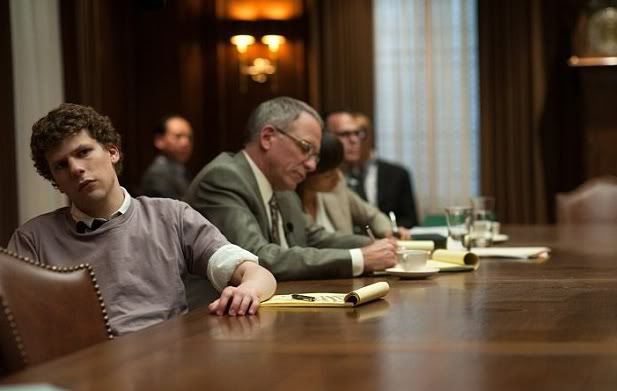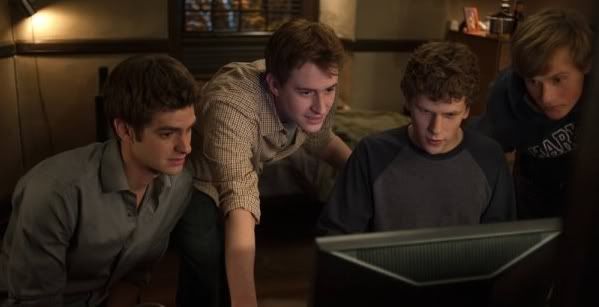
The Social Network details the development of social networking hub Facebook, as the site developed from the drunken game of Harvard computer whiz Mark Zuckerberg (Jesse Eisenberg) into a worldwide phenomenon. Facebook has arguably had a tremendous impact on Internet communication, but this film, directed by David Fincher from a script by Aaron Sorkin, doesn't have much to say about the ways in which the site has or has not changed the Internet. Instead, it's more of a psychological and legal drama about the desire for acceptance, the bizarre anti-logic of business in the dot-com era, and of course the American passion for betrayals and lawsuits. The film is, among other things, a scathing portrait of Facebook founder Zuckerberg, who is here portrayed as a disconnected, selfish jerk who betrayed his friends and built his ideas upon the foundation laid by others. The film is a profile of Zuckerberg, but more than that it's a profile of a time (the early-to-mid 2000s) and a place (mostly the inner workings of Harvard University) from a director whose best work has often made geography and time central concerns.
Like Fincher's Zodiac before it, The Social Network is a historical film, but a historical film that is set a mere seven years in the past. It is, nevertheless, history, and Fincher is as deliberate and detail-oriented in recreating the feel of an early 2000s college campus as he was in capturing the feel of 70s San Francisco. The campus at night, bathed in eerie yellow lights and accompanied by the moody music of Trent Reznor (whose effective score, in collaboration with Atticus Ross, alternates between low-key background buzz and bursts of dancey pop-industrial), becomes as powerful a presence in the film as the dangerous nighttime vistas of Zodiac. And the film's detours into college parties — from the glitzy, privately catered affairs of the elite frats to cheesy theme nights and rowdy, drug-fueled house parties — resonate with telling details. The era that Fincher is evoking so concretely here is precisely the era before Facebook changed youth culture by, as Zuckerberg says, putting college social life online. To some extent, in this era where a few years can bring and have brought massive changes in technology, nostalgia cycles have shortened to the point where this film can be nostalgic for the pre-Facebook technology and web culture of a few years ago, when blogs still seemed somewhat novel and websites like MySpace and LiveJournal were at the cutting edge.
Fincher loves dealing with process, methodically following the steps, treating every story like a case to be solved; one suspects that he identified very strongly with Jake Gyllenhaal's Robert Graysmith in Zodiac. Sorkin's script for The Social Network allows Fincher to indulge that fascination with process, as the narrative carefully traces the development of Facebook from the coding right up to the business dealings to the inevitable lawsuits that followed. It's a multi-leveled examination of this story that recalls Zodiac in many ways: of all Fincher's films, there is clearly the strongest connection between his serial killer process piece and his dissection of a website's birth. Both films are backward-looking, and The Social Network makes its retrospective nature explicit by continually cutting back and forth from the dual lawsuits against Zuckerberg to the events that led up to that point. Where the earlier film delved into the gathering of evidence and the obsessive analysis of clues, The Social Network revels in the minutiae of coding and algorithms and innovations.

Although The Social Network is never quite as affecting or as evocative as Zodiac, which is still Fincher's best film, this is a sharp, witty film, packed with great characters and scenes that reveal the mix of careful research and keen observation that Sorkin and Fincher bring to this film. Sorkin famously got tips from Harvard alum Natalie Portman on the secrets of the school's exclusive "final clubs," and this knowledge shows through in the periodic inserts of fraternity hazing and private parties where these privileged elites unwind. The idea of privilege is a key subtext here, as the original germ of an idea for Facebook was to create a social networking site that sets itself apart through exclusivity — specifically, the exclusivity of Harvard prestige. Twin rowing champions Cameron and Tyler Winklevoss (Armie Hammer), who eventually wind up suing Zuckerberg for stealing their ideas, embody that privilege, the inherited elitism of being born into money and feeling entitled to the benefits of that lineage. At one point, outraged by what they see as Zuckerberg's thievery, they use their connections to wrangle a meeting with the president of Harvard, but they're non-plussed when he responds to their complaints with contemptuous jokes and berates them for expecting special treatment because of who their father is. It's a great scene, and a scene that one suspects Zuckerberg himself would appreciate, as it deflates those who just naturally have all the money, charisma, success and athleticism that Zuckerberg seems so desperately to want.
Zuckerberg's complicated attitudes about privilege and elitism — resentment and contempt mingled with his own air of entitlement — also wind through the film. Eisenberg perfectly captures the snobby, snotty, clipped tone of an insecure young geek who's convinced that he should get whatever he believes he deserves — who's convinced, simultaneously, both that he's better than everyone around him, and that everyone else thinks he's insignificant. It's that mix of profound insecurity and outrageous self-confidence, projected in every twitch and mutter of Eisenberg's pitch-perfect performance, that really sells this character, and to some extent the film as a whole. It's a totally satisfying performance of an absolutely aggravating and unlikeable character. Fincher earns equally great performances from everyone in this film, and Justin Timberlake, as Napster co-founder Sean Parker, is especially potent, projecting the hyperactive enthusiasm and radical pose of a new generation of Internet entrepeneurs who ride waves of grassroots guerilla programming to international prominence. But despite Timberlake's flashy and fun performance — witness the obvious pleasure he gets from telling a recent conquest that he's a kind of Internet celebrity — it's the quieter, more restrained Eisenberg who remains at the film's core.
As good as Eisenberg is in this role, the script occasionally does him a disservice, most notably with the conceit of hinging so much of Zuckerberg's motivation and psychology on his rejection by girlfriend Erica (Rooney Mara), who he insults on his blog after their nasty breakup at the start of the film. It's a simplistic thread of pop psychology that even provides the predictable emotional punchline before the end text describes the outcomes of the lawsuits, another all-too-typical legal drama touch. These kinds of pat movie devices don't serve the film well: the all-too-easy intimation that Zuckerberg started Facebook to get revenge on a girl, that his obsession with her continued to drive him for years afterward, conflicts against the subtlety and complexity evinced by the film elsewhere. The film is at its best when it's patiently setting the scene, building up the atmosphere of a college campus and establishing the character of Zuckerberg as an impatient genius whose lack of social niceties make him an unlikely choice for the founder of the world's most successful social website. Sorkin's eloquent, frequently funny script makes the film a lot of fun, whether its gently mocking the pretensions of the Harvard elite (although the Winklevii, as Zuckerberg memorably dubs them, do ironically emerge not as stock villains but as more sympathetic characters than their rival in some respects) or nailing the strange twists of college life (like a great subplot involving a chicken and "forced cannibalism"). This is a smart, entertaining, and often incisive film that merges the in some ways quite distinct aesthetics of Fincher and Sorkin to create a very compelling hybrid.








0Awesome Comments!